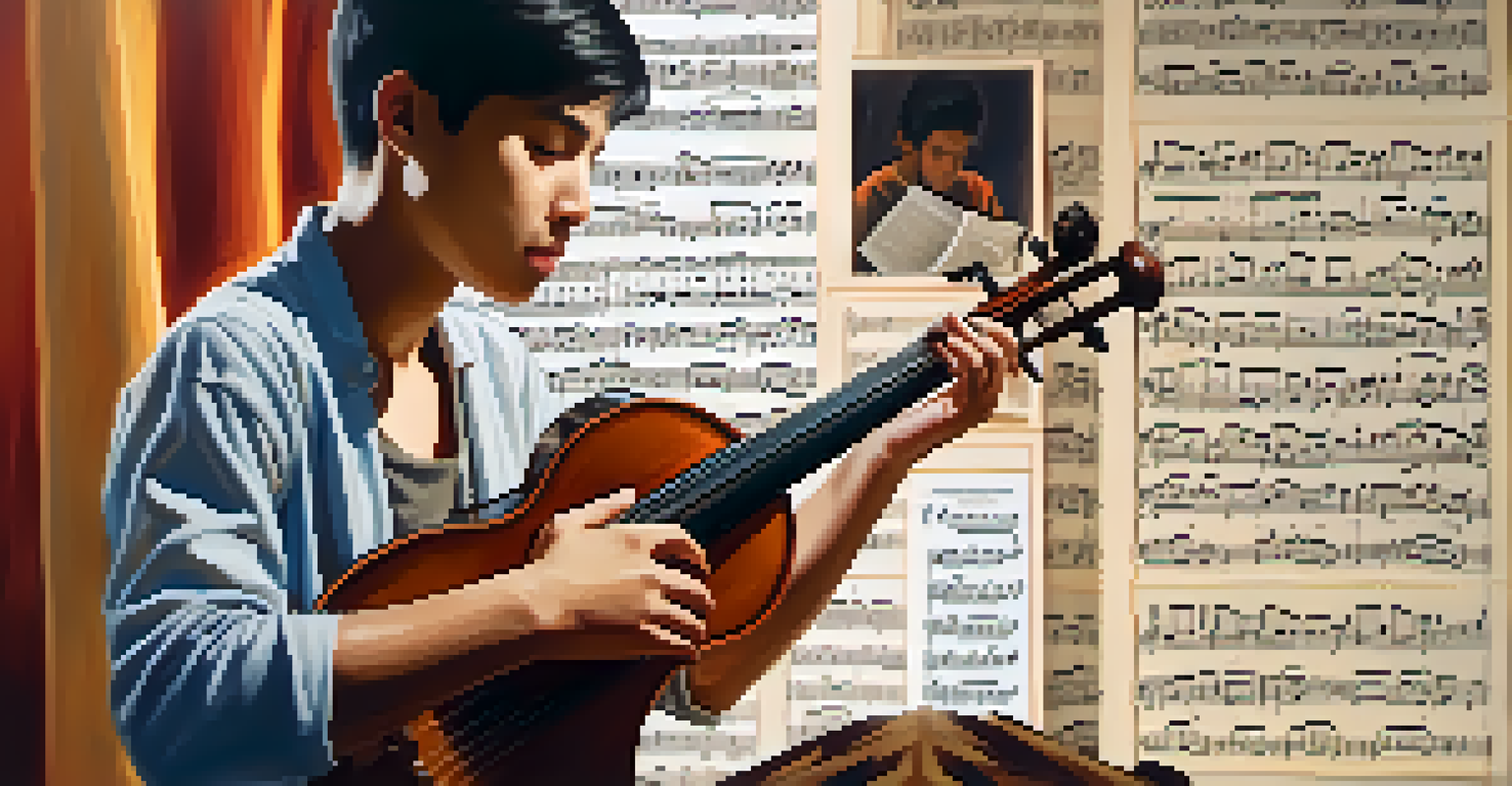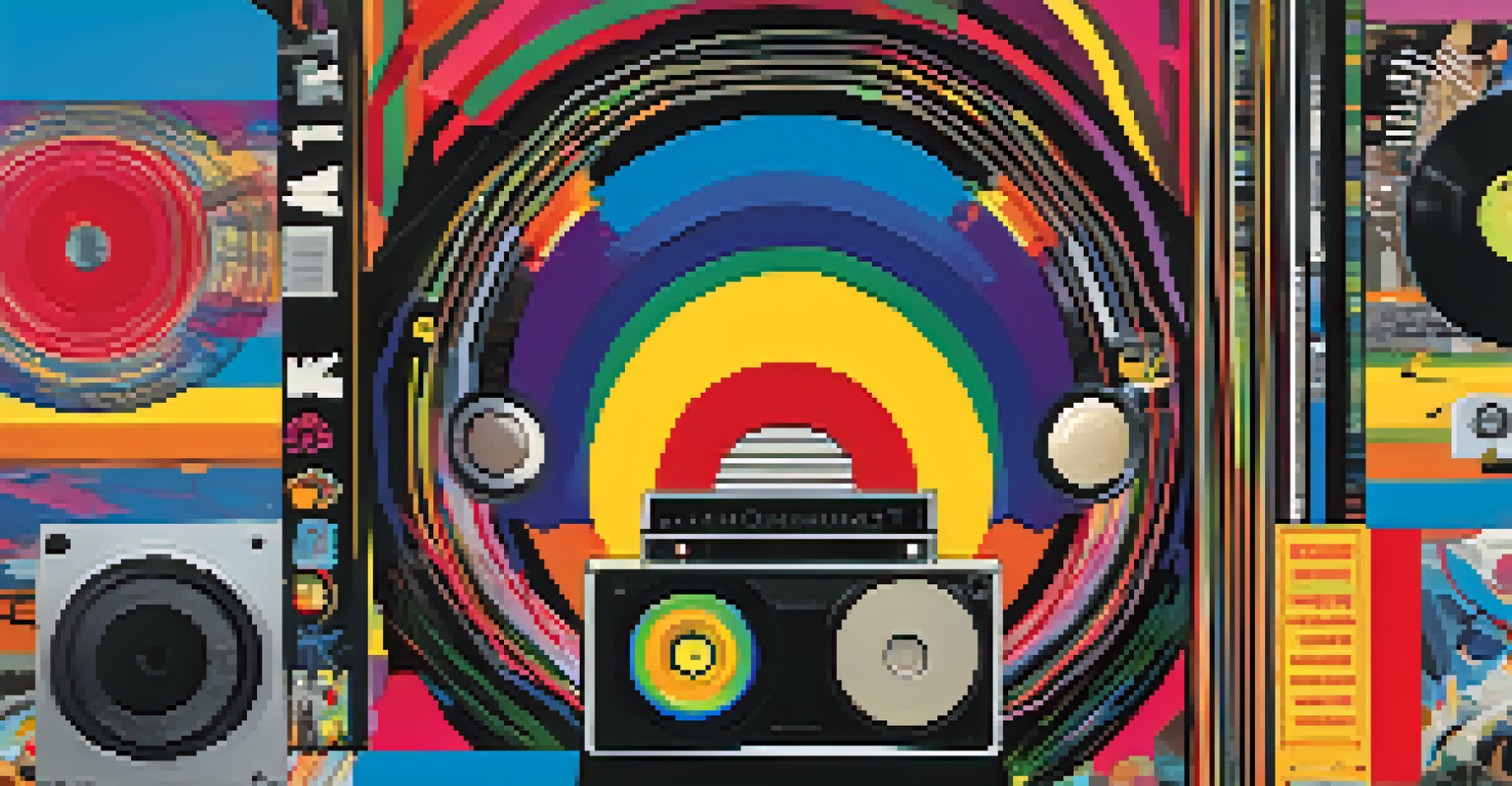Cultural Identity and Music: A Youth Perspective

Understanding Cultural Identity Through Music
Cultural identity is a complex tapestry woven from our backgrounds, traditions, and shared experiences. For many young people, music serves as a vibrant thread in that tapestry, helping them connect with their roots. It’s not just about the tunes; it’s about the stories, emotions, and histories behind them that resonate deeply.
Music can change the world because it can change people.
Young listeners often find solace and strength in songs that reflect their cultural narratives, allowing them to articulate their feelings and experiences. For instance, a teenager from a multicultural background might relate to hip-hop's storytelling or the rhythms of traditional folk music. This connection helps them navigate their identity in a world where they may feel pulled in different directions.
Moreover, music allows youth to explore and embrace their cultural identities in ways that feel authentic. Whether it's through learning traditional dance or participating in community events, music acts as a bridge, facilitating conversations and connections that enrich their understanding of themselves and others.
The Role of Genres in Shaping Identity
Music genres often reflect diverse cultural influences, contributing significantly to how young people perceive their identity. For example, genres like reggae, hip-hop, and K-pop not only entertain but also convey powerful messages about resilience, social justice, and belonging. Young fans immerse themselves in these sounds, often finding a sense of community among fellow listeners.

Take K-pop, for instance: it has exploded in popularity across the globe, transcending language barriers and cultural divides. This genre allows fans to engage with South Korean culture while also expressing their individuality. Youth often adopt elements from various genres, blending them into their unique musical identities, which creates a rich cultural exchange.
Music Shapes Cultural Identity
Music serves as a vital connection for youth, helping them explore and articulate their cultural backgrounds and personal experiences.
By engaging with different genres, youth can also redefine cultural narratives. When they share and remix music from their heritage with contemporary influences, they’re not just preserving their culture; they're evolving it, making it relevant for their generation.
Social Media's Impact on Musical Identity
In today's digital age, social media platforms play a pivotal role in shaping musical identities. Young people use platforms like TikTok and Instagram to discover new sounds and share their interpretations, creating a global music community. This online space encourages collaboration and interaction, allowing youth to express their cultural identities in innovative ways.
Where words fail, music speaks.
Through viral trends and challenges, music becomes a shared language that transcends geographical boundaries. For instance, a dance challenge set to a traditional African beat can spark interest in the culture behind it, prompting young users to explore further. This kind of engagement fosters appreciation and understanding among diverse groups.
Moreover, social media allows youth to reclaim and redefine their cultural narratives. By curating playlists and sharing personal stories tied to specific songs, they create a digital scrapbook of their musical journey, showcasing how their identity evolves in real-time.
The Influence of Music Festivals on Youth Culture
Music festivals have become cultural melting pots where young people converge to celebrate diverse musical expressions. These events provide a unique opportunity for youth to immerse themselves in different cultures through music. From Coachella to local community festivals, the experience fosters a sense of belonging and shared identity among attendees.
At these festivals, youth are exposed to a wide array of genres and cultures, often sparking curiosity and appreciation for unfamiliar sounds. They might discover a love for Afrobeat at one festival and explore Latin music at another, enriching their musical landscape. This exposure encourages them to embrace new cultural identities while honoring their own.
Social Media Amplifies Musical Voices
Platforms like TikTok and Instagram empower young people to share their musical interpretations and engage with diverse cultural narratives.
Additionally, festivals often highlight social issues, promoting awareness and activism among young attendees. When music serves as a backdrop to important conversations, youth are inspired to advocate for change, using their cultural identities as a driving force in their communities.
Exploring Heritage Through Music Education
Music education plays a crucial role in helping youth explore and understand their cultural heritage. Many schools and community programs offer classes that focus on traditional music styles, allowing students to connect with their roots. This educational approach not only fosters skill development but also cultivates a sense of pride in one’s cultural identity.
For example, learning to play an instrument associated with a particular cultural tradition can deepen a young person’s appreciation for that heritage. It creates a tangible connection, enabling them to pass down stories and values through generations. This process of learning often ignites a passion for further exploration of their cultural history.
Moreover, music education encourages collaboration among students from diverse backgrounds. When young people come together to create music, they share their unique perspectives and experiences, contributing to a collective cultural narrative that celebrates diversity and unity.
Music as a Tool for Social Change
Music has long been a powerful tool for social change, and today's youth are harnessing that power like never before. Through their songs and lyrics, they address critical issues such as inequality, climate change, and mental health. This activism not only reflects their cultural identities but also inspires others to join the conversation.
For instance, artists like Billie Eilish and Hozier use their platforms to advocate for environmental sustainability and social justice. Their music resonates with young audiences, encouraging them to take action and voice their concerns. This synergy between music and activism empowers youth to become change-makers in their communities.
Festivals Foster Cultural Exchange
Music festivals create spaces for youth to immerse themselves in various cultures, enhancing their appreciation for diversity and community.
Additionally, participating in music-driven movements allows young people to forge connections with others who share their values. Whether through organizing benefit concerts or using music to raise awareness online, they create a sense of solidarity that strengthens their cultural identity and fosters a collective spirit.
The Future of Cultural Identity in Music
As technology continues to evolve, the future of cultural identity in music is promising and dynamic. With the rise of artificial intelligence and virtual reality, new forms of musical expression are emerging, allowing youth to explore their identities in even more immersive ways. This evolution presents endless possibilities for creative collaboration and cultural exchange.
Young musicians today are experimenting with blending genres and sounds, reflecting a more globalized world. This experimentation not only celebrates their cultural backgrounds but also challenges traditional boundaries, creating a rich tapestry of musical innovation. The result is a diverse landscape that represents the multifaceted identities of today’s youth.

Ultimately, the future of cultural identity in music lies in the hands of the youth. As they continue to shape and redefine what it means to be culturally connected, they will undoubtedly inspire future generations to embrace their identities and celebrate the power of music in bringing people together.